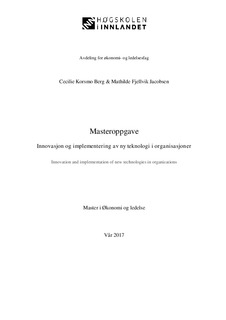Innovasjon og implementering av ny teknologi i organisasjoner
Master thesis
Permanent lenke
http://hdl.handle.net/11250/2447459Utgivelsesdato
2017Metadata
Vis full innførselSammendrag
Formålet med studien er å beskrive og forstå hvordan innovasjonsprosessen utfolder seg i en organisasjon, slik at vi kan danne grunnlag for å vurdere hvordan kontekstuelle variasjoner påvirker adopsjon og opplevelse hos brukere av en ny teknologi. Problemstillingen er derfor som følger: Hvordan kan kontekstuelle variasjoner virke hemmende eller fremmende for innovasjonsprosessen ved implementering av ny teknologi i organisasjoner? Gjennom en casestudie fikk vi tilgang til både prosjektprosessen, men også hvordan brukere av teknologien har opplevd design, utforming, implementering og bruk. Vi har gjennomført 14 semistrukturerte intervjuer, hvorav to med produktkteiere og 11 med brukere. I tillegg har vi fått tilgang til prosjektdokumentasjon. Vi identifiserte både adopters og non-adopters blant informantene, hvilket bidro til at vi kunne drøfte både enablers og barrierer for adopsjon. Samtidig fremkom det at IT-systemet i casen bestod av to ulike funksjoner, hvor vi fant ulik grad av adopsjon for de to bruksområdene. Dette åpnet ytterligere for å sammenligne og drøfte hvordan prosjekt- og utviklingsprosessen hadde påvirket adopsjon og brukeropplevelse. Vi har gjennomført den teoretiske analysen med bakgrunn i både Diffusion of Innovations og Innovations Translation Model. De to analytiske rammeverkene bidro til å belyse empirien med konfronterende perspektiver, hvilket har gitt et bredere bilde av hvilke forhold som påvirker adopsjon og bruk. Våre funn viser at en innovasjons egenskaper ikke kan forstås uten å samtidig se på hvilke kontekstuelle forutsetninger som danner grunnlaget for utvikling og bruk av IT-systemet. Dette kan forklares ved at samhandling mellom aktører varierer i tid og rom, slik at bruksmønster omgjøres i samspill med konteksten. Våre funn bekrefter at innovasjonsprosessen preges av interaksjon, informasjonsdeling, samarbeid, tilpasning og fleksibilitet. Abstract (engelsk sammendrag)
The purpose of this study is to describe and to understand how the innovation process unfold in organizations, so that we can provide a basis for assessing how contextual variations affects the adoption and user experience regarding new technology. The study is based on the following research question: How can contextual variations act as enablers or barriers for the innovation process when implementing new technologies in organizations? Through a case study we gained access to both the project process, but also how the users experienced the design, configuration, implementation, and use of the technology. We have conducted 14 semi-structured interviews, two of which were conducted with product owners and 11 with users. In addition to this, we have accessed project documentation. We identified both adopters and non-adopters among the interviewees, which helped us discuss both enablers and barriers for adoption. The IT-system also consisted of two different functions, where we found different degrees of adoption among the two different user areas. This provided opportunity to further compare and discuss how the project- and development process had impacted adoption and user experience. We have conducted the theoretical analysis based on both Diffusion of Innovations, and Innovations Translation Model. The two analytical frameworks helped to illustrate empirical confrontational perspectives, providing a wider view of the aspects that affect adoption and usage. Our findings suggest that the characteristics of an innovation cannot be understood without simultaneously looking at the contextual assumptions that form the basis for both the development and the usage of the IT system. This can be explained by how interaction between actors varies in time and space, so that usage patterns are transformed in conjunction with the context. We confirm that the innovation process is characterized by interaction, information sharing, collaboration, adaptation, and flexibility.
Beskrivelse
Dybdebasert master, 120 studiepoeng. Spesialisering økonomi.
